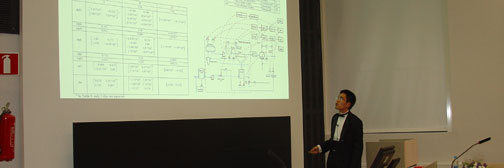| | Year 2009
Juan José Andrade NegreteFault Diagnosis Scenario for the Lubricating System of a Cone Crusher
Industrial processes have been gradually evolving over the years, thus becoming more demanding and complex. As a consequence of this evolution, the development of new techniques and methods that satisfy the demands of the industry has also been experiencing several changes and it has been following a similar tendency. Furthermore, process monitoring and fault diagnosis methods are increasingly being adopted in industries as an important part of plant operation, due mainly to the necessity of maintaining the process within desirable operating regions and far from faulty situations, which may be translated into unplanned shutdowns and downtimes.
This master’s thesis aims to analyze typical faults in a lubricating system that is usually employed for the operation of cone crushers as well as to search for the possibility to detect those faults by using existing and/or new measurements from this lubricating system.
In the literature part, the crushing technologies that are commonly available for different crushing requirements as well as the instrumentation and control strategies typically used in this kind of processes are presented together with the published studies regarding crushing processes. Moreover, the main groups classifying the fault detection and diagnosis methods are briefly presented in this part of the thesis.
In the experimental part, faults in the lubricating system that is usually employed for the operation of Metso Minerals cone crushers are analyzed using information (provided by Metso Minerals) regarding HP and GP series cone crushers. This part of the thesis also describes the current lubricating system of these crushers.
Finally, the experimental part of this thesis proposes a fault detection and monitoring system which aims to detect the presence of faults by applying advanced process monitoring and fault diagnosis methods, together with some sensor additions and changes, to the information obtained from the lubricating system, although future research and full-scale tests would be required in order to assess the feasibility of each module comprising the system.
This info last modified 27 Apr 2024 by Jerri Kämpe-Hellenius
|

